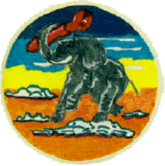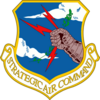41st Air Refueling Squadron
This article has multiple issues. Please help improve it or discuss these issues on the talk page. (Learn how and when to remove these messages)
|
41st Air Refueling Squadron
 | |
|---|---|
 Squadron KC-135A Stratotanker at RAF Mildenhall | |
| Active | 1944–1946; 1947 1958–1993 |
| Country | |
| Branch | |
| Role | Aerial refueling |
| Engagements | 1949; |
| Insignia | |
| Patch with 41st Air Refueling Squadron emblem |  |
| 41st Bombardment Squadron emblem (approved 17 April 1945)[1] |  |
The 41st Air Refueling Squadron is an inactive United States Air Force unit. It was last assigned to the 380th Operations Group at Griffiss Air Force Base, New York, where it was inactivated on 15 February 1993.
History
World War II
Activated 1 April 1944 at Dalhart Army Airfield, Texas. Initially equipped with B-17 Flying Fortresses for training, due to shortage of B-29 Superfortresses. Moved to Harvard Army Airfield, Nebraska, in August 1944 and equipped with B-29B limited production aircraft.
After completion of training deployed to Central Pacific Area (CPA), assigned to XXI Bomber Command, Northwest Field (Guam) for operational missions. B-29Bs were standard production aircraft stripped of most defensive guns to increase speed and bomb load, The tail gun was aimed and fired automatically by the new AN/APG-15B radar fire control system that detected the approaching enemy plane and made all the necessary calculations.
Mission of the squadron was the strategic bombardment of the Japanese Home Islands. Dntered combat on 16 June 1945 with a bombing raid against an airfield on Moen. Flew first mission against the Japanese home islands on 26 June 1945 and afterwards operated principally against the enemy's petroleum industry. Flew primarily low-level, fast attacks at night using a mixture of high-explosive and incendary bombs to attack targets.
Flew last combat mission on 15 August 1945, later flew in "Show of Force" mission on 2 September 1945 over Tokyo Bay during formal Japanese Surrender. Inactivated on Guam 15 April 1946, personnel returned to the United States and aircraft sent to storage in Southwest United States.
Air Force Reserve
Allotted to the Air Force Reserve as a Tactical Air Command B-26 Invader light bomb group in 1947. Inactivated in 1949 due to budget restrictions.
Cold War
Stationed at Griffiss AFB, the squadron provided air refueling to Strategic Air Command and other tactical aircraft using KC-135 Stratotankers (1966–1976) on a worldwide scale.
Lineage
|
41st Bombardment Squadron
|
41st Air Refueling Squadron
|
Assignments
- 6th Bombardment Group, 1 April 1944 – 10 May 1944
- 501st Bombardment Group, 1 June 1944 – 10 June 1946
- 448th Bombardment Group, 12 July 1947 – 27 June 1949.
- 4039th Strategic Wing, 5 January 1959
- 416th Bombardment Wing, 1 February 1963
- 416th Operations Group, 1 September 1991
- 380th Operations Group, 1 June 1992 – 15 February 1993
Stations
- Dalhart Army Air Field, Texas, 1 April 1944 – 10 May 1944; 1 June 1944
- Dalhart Army Air Field, Texas, 1 June 1944
- Harvard Army Air Field, Nebraska, 23 August 1944 – 7 March 1945
- Northwest Field (Guam), 14 April 1945 – 10 June 1946
- Long Beach Municipal Airport, California, 12 July 1947 – 27 June 1949.
- Air Mobility Command to activate or inactivate as needed, 12 June 2002[2]
Aircraft
- Boeing B-29 Superfortress, 1944–1946
- Douglas B-26 Invader, 1947–1949
- Boeing KC-135 Stratotanker, 1959–1993
References
- Notes
Bibliography
![]() This article incorporates public domain material from the Air Force Historical Research Agency
This article incorporates public domain material from the Air Force Historical Research Agency
- Maurer, Maurer, ed. (1983) [1961]. Air Force Combat Units of World War II (PDF) (reprint ed.). Washington, DC: Office of Air Force History. ISBN 0-912799-02-1. LCCN 61060979. Retrieved 17 December 2016.
- Maurer, Maurer, ed. (1982) [1969]. Combat Squadrons of the Air Force, World War II (PDF) (reprint ed.). Washington, DC: Office of Air Force History. ISBN 0-405-12194-6. LCCN 70605402. OCLC 72556. Retrieved 17 December 2016.
- Ravenstein, Charles A. (1984). Air Force Combat Wings, Lineage & Honors Histories 1947–1977. Washington, DC: Office of Air Force History. ISBN 0-912799-12-9. Retrieved 17 December 2016.


